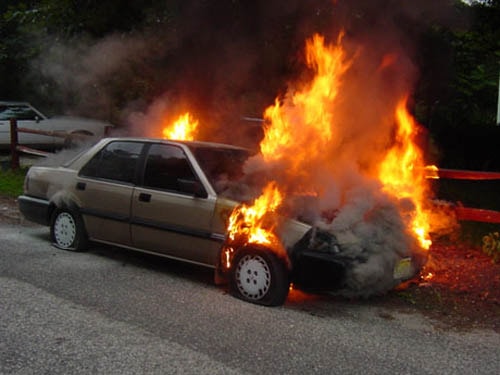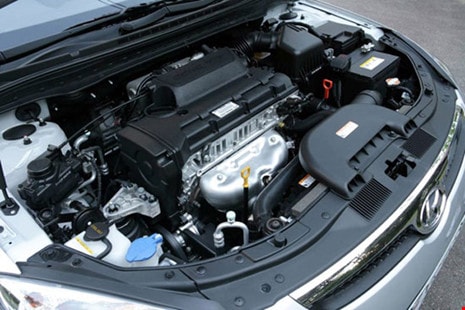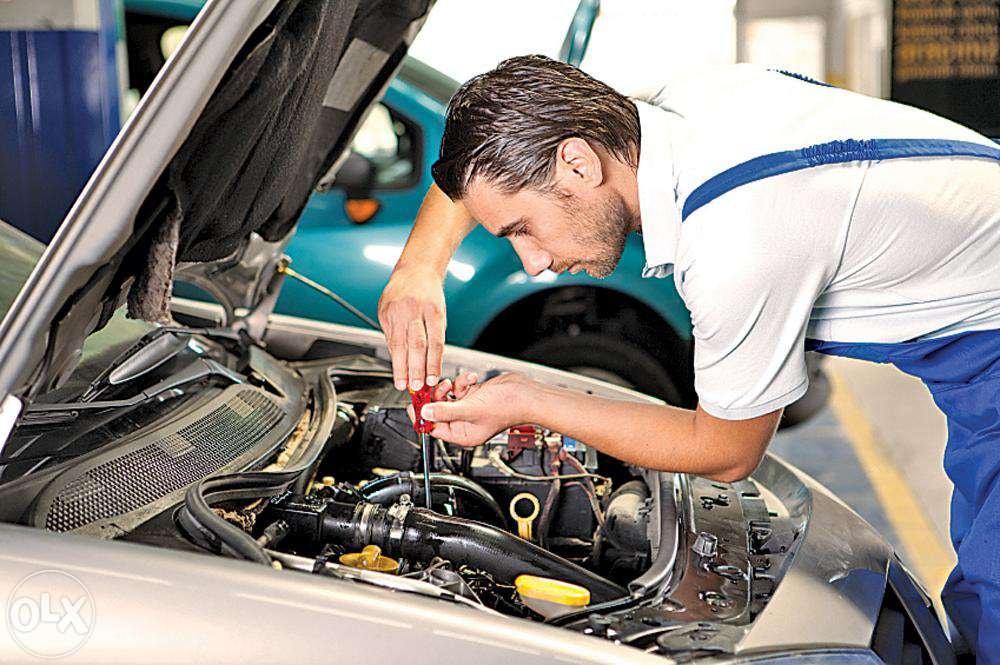Car Fire: What is the Cause?
Recently, many car fires have occurred consecutively, causing many people to worry. To avoid unfortunate incidents, drivers need to equip themselves with skills and experience to recognize the causes and ways to prevent car fires.
According to experts, car fires have many causes, but focus on the following factors:
Design flaws
Design flaws don’t typically cause a fire, but they can create conditions ripe for one. But automakers caught on pretty quickly and have been recalling potentially fire-prone vehicles for repairs.
 |
| Recently, many cases of cars spontaneously catching fire have occurred. |
Car collision
A car crash can cause a fire. Because a hard crash can cause fuel to leak out, it can hit a hot part of the engine or randomly create a spark that will cause the new car to catch fire.
Overheated catalytic converter
One of the hottest parts running the length of your car is the exhaust system. The catalytic converter overheats because it is working too hard to move the exhaust gases out. In other words, if the engine is not working efficiently, the catalytic converter has to work harder. This is a danger to your car.
Engine overheating
An overheated engine cannot spontaneously combust. But when an engine overheats, rubber or plastic seals can fail, allowing engine fluids such as fuel, oil, and coolant to escape. When these droplets fall on other hot parts, they can cause a car fire.
Leakage of flammable substances
Under the engine compartment of a car there are always flammable substances such as gasoline, oil, lubricants, even coolant. When they spill or leak, it will be one of the causes of car fires.
 |
| Overheating engine can also easily lead to car fire. |
Power failure
A faulty electrical system is one of the most common causes of fires. Electrical systems are located throughout the vehicle. When an electrical short occurs, a spark will be released and even a drop of flammable material can leak and burst into flames.
Fuel line malfunction
The cause of this situation is due to the nozzle gasket malfunctioning and not being able to seal properly, causing fuel to leak out. In addition, the nozzle and fuel line can also crack due to engine heat, causing fuel to drip out.
Open exhaust pipe
Over time, the exhaust pipe shows signs of corrosion, causing gaps. Since the exhaust pipe is a high-temperature part, when the pipe is open, hot exhaust gas will leak out and ignite flammable materials caught under the vehicle such as cloth, plastic bags, cardboard, etc. If the engine does not burn all the gasoline in the cylinder, this amount of gasoline will continue to burn outside the exhaust pipe. In this case, the vehicle is more likely to explode.
Power steering fluid
Power steering fluid can cause an explosion if it splashes onto the exhaust manifold. Here, the high temperatures in contact with the power steering fluid can ignite and cause a vehicle fire.
How to prevent car fire and explosion
To avoid unfortunate incidents, drivers need to equip themselves with skills and experience to recognize the causes and ways to prevent vehicle fires.
- Proactively check, detect and promptly fix problems and breakdowns when the vehicle shows unusual signs (difficult to start, has gasoline vapor, makes noise, high engine temperature, burning smell).
- When parking indoors or in a parking lot, turn off the ignition, close the gas valve, and keep away from fire and heat sources.
 |
| Regular car maintenance and repair will reduce the risk of car fire. |
- Use fuel (gasoline, oil) of the correct type and quality as prescribed; do not buy gasoline or oil at unauthorized points of sale.
- Do not leave flammable or combustible substances in the vehicle, under the seat, or in the engine compartment; owners of motor vehicles with 4 seats or more must equip themselves with appropriate fire extinguishers according to the provisions of the Fire Prevention and Fighting Law.
- Do not install additional equipment or accessories that consume electricity such as protective devices, horns, lights, etc., or if installed, ensure that there is no electrical overload; comply with the prescribed operation, maintenance, and repair procedures and must maintain, service, and repair at places that guarantee quality.
- The best way to minimize the risk is to regularly maintain and repair your vehicle at reputable places.
How to handle a car fire or explosion
- When a fire or explosion occurs or smoke, unusually high temperature, or a burning smell is detected, the driver must calmly turn off the ignition, park, or park the vehicle on the side of the road away from places with many people and flammable substances. When a car catches fire, find every way to get people out of the car and put out the fire.
- The fuel tank should be locked immediately if possible (for vehicles with a fuel lock design).
- Use fire extinguishers, sand, and water to put out the fire and call for help. Immediately call the Fire Prevention Police at 114 or the nearest police, local authorities, etc. to coordinate fire fighting, investigate and determine the cause, and promptly take action.
- In case of inability to extinguish the fire, quickly move away from the burning vehicle to a safe location.
According to VNN
| RELATED NEWS |
|---|

